Members of Sukoró Reformed Congregation had started a fundraiser to buy medical equipment and supplies to a charity hospital in Nigeria, but the current pandemic has forced them to modify their plans. It seems that instead of equipment and bandages, the funds raised by Sukoró’s Reformed community will be spent on rice.
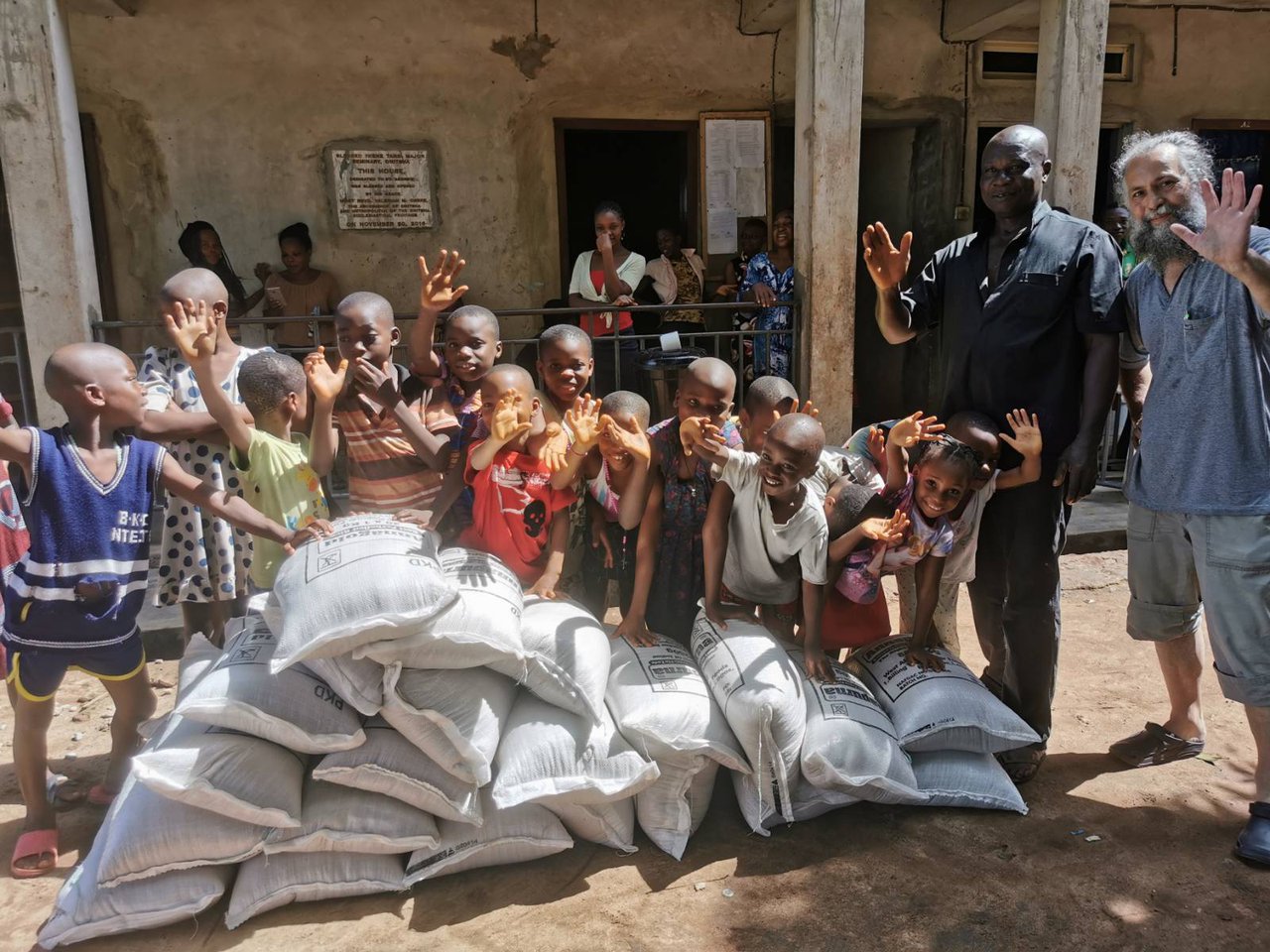
It has been nearly three years since neurosurgeon Dr. György Szeifert moved from Veresegyház in Pest County to a village called Sukoró, some 80 km away. Had the professor not decided to leave behind the sight of the Danube for the beauty of Lake Velence, the Reformed congregation of Sukoró might never have started a fundraiser to support a distant charity hospital, which is run by the Roman Catholic Church and is located over 6000 km away in Nigeria.
Mysterious Ways
Why Nigeria, of all places? Our readers might have heard the name of another neurosurgeon, Dr. András Csókay, who has recently made national and international headlines several times after he and his medical team successfully separated two Bangladeshi twin sisters, Rabeya and Rukaya, who had been born conjoined at the head, during an over thirty-hour-long operation.
Back in the 2000s, Dr. Csókay was co-founder of the Action For Defenceless People Foundation. One of the foundation’s aims, apart from supporting Hungarian hospitals, was to provide treatment to underprivileged patients in poorer countries, who otherwise would have no chance of healing.
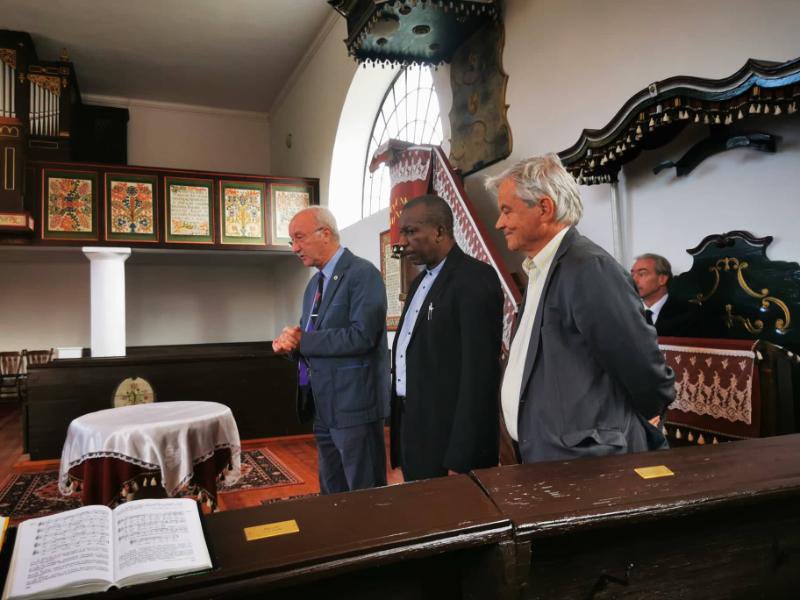
György Szeifert, hospital CEO Izunna Okonkwo and András Csókay at Sukoró Reformed Church
Since then, the foundation’s charity medical team has been travelling not only to Bangladesh to perform plastic and neurological surgeries on a regular basis, but since 2017 they have also been working in Nigeria, which is the most populous country of Africa, with its population of two hundred million. ‘There is no free state-run health care in Nigeria, and only a tiny proportion of the population has any kind of health insurance,’ explains György Szeifert, who this year has participated in the Hungarian medical mission of Action Foundation for the third time. The professor told us that when his good friend and colleague András Csókay first brought up the idea of an African mission in 2017, he said yes immediately.
OVER A HUNDRED OPERATIONS IN THREE YEARS
The aim of the foundation was to arrange ongoing and free neurosurgical treatment at St Charles Borromeo Hospital in Onitsha, which is Nigeria’s largest non-governmental health care institution. It is run by the Roman Catholic Church with no state subsidies. ‘The point of this mission is that we, Hungarian “missionaries” perform operations without remuneration in this church-run hospital,’ says György Szeifert, who is one of the doctors who undertook this foreign mission, treating poor people free of charge.
The travelling expenses of the missionary doctors are covered by Afréka Foundation, created by Dr. Réka Fodor; their meals and accommodation are provided by the local hospital. While the doctors are getting ready in Hungary for a mission, St Charles Borromeo Hospital compiles a list of patients who would not be able to afford the cost – four to five thousand US dollars – of a neurological surgery. ‘I always go in February for a full month, and this has been my third time there. Over the past three years, we have completed over a hundred operations,’ Dr. Szeifert reveals, who, alongside András Csókay, performs spine and brain surgeries amid rather humble circumstances in the Nigerian hospital.
Organist-neurosurgeon
György Szeifert was born in 1953 in Debrecen, and early in his studies he completed the Cantor Training of the Reformed College of Debrecen, therefore he is a qualified organist. Apart from being one of the organizers and performers of the traditional Neurosurgical Christmas Organ Concerts, he gives an organ concert in Sukoró’s Reformed church once a month. He has also released an album, playing pieces by Bach, Franck and Purcell on the organ of Budapest’s Matthias Church.
It was not only surgeries that the Hungarian professor performed during his one-month stay in Nigeria. As he explains, last year a new clinic was erected next to the hospital, where the primary focus is on outpatient medical care. ‘I also worked there twice a week,’ Dr. Szeifert reveals. He was surprised to see that in honour of the Hungarian missionaries, the locals displayed the Hungarian flag at the clinic, right next to the Nigerian one.
Poverty and Faith
‘The poverty the local people live in is inconceivable, even from an Eastern-European point of view, and yet they have so much faith! This is what struck me the most. One could say that their faith in God is just as great as their poverty. This is what keeps them alive,’ explains György Szeifert. Nearly half of the two hundred million residents consider themselves Christian, with an especially high number of Catholic believers. Dr. Szeifert could see it first-hand that while in Hungary and Western Europe churches are often all but empty on a Sunday, in Nigeria religious centres and worship locations are packed to the rafters.
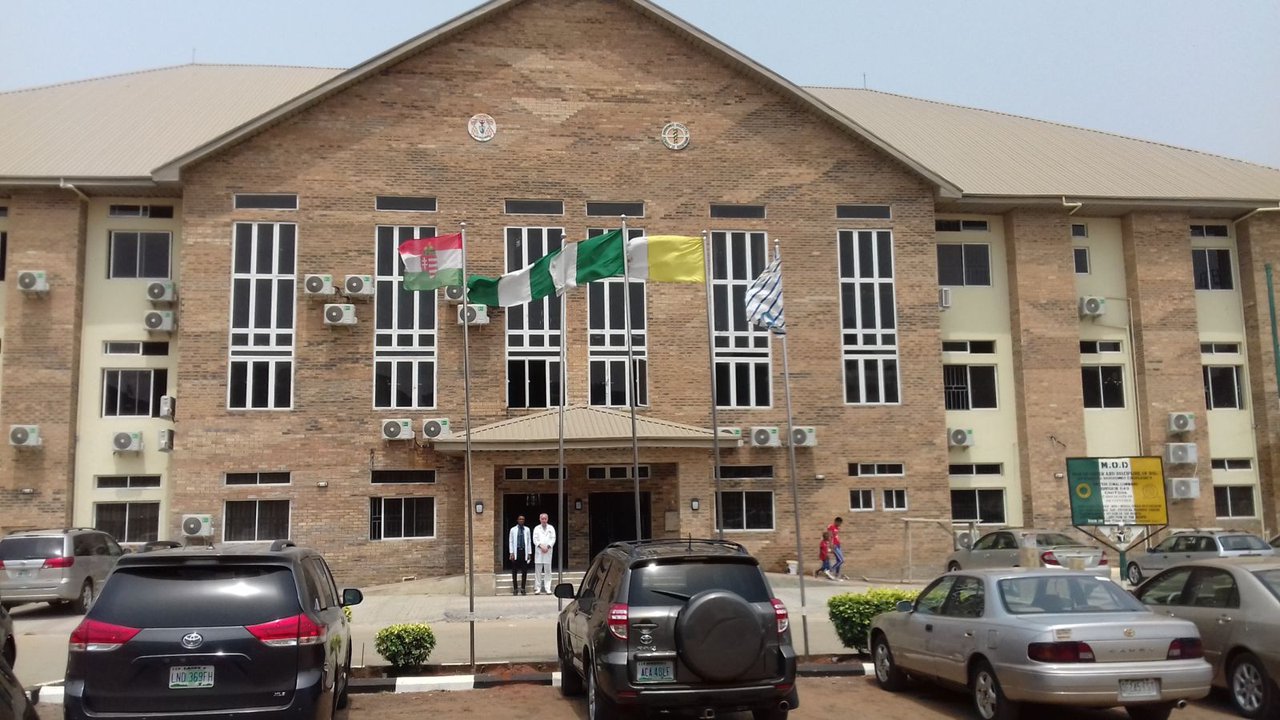
Hungary’s flag on the Nigerian hospital
‘The hospital has its own chapel with room for three to four hundred people, and every day starts with mass at 6 am. When the service ends an hour later, the hospital staff commence their daily duties. On Sundays, the chapel is filled with children and adults alike,’ the doctor recalls, adding that it does not matter whether someone is Catholic or Protestant: if you want to pray, you can do so in both churches.
‘The CEO of the hospital in Onitsha is an ordained priest himself, and in the mornings I accompanied him to the chapel, where we could pray together. When a person wants to help someone else, it does not matter in the least whether they are Baptist, Lutheran or Catholic. Our God is one and the same.’
SUKORÓ CONGREGATION INITIATIVE
Rev. Ábel Kardos, Sukoró’s Reformed pastor can vividly remember the Sunday in 2017 when György Szeifert appeared in Sukoró’s Reformed church for the first time. He has been a regular church-goer there ever since. Later on the professor gave an enthusiastic talk to the Sukoró Christian Association about his first successful mission to Nigeria, but it was when they received a few special visitors one day that the congregation finally decided to act.
Last September, right before the church’s renovation was about to begin, the Sunday service was attended not only by the regular members of the Sukoró congregation, but also by András Csókay and his wife, as well as by Izunna Okonkwo, the CEO of the hospital in Onitsha and Dr. Réka Farkas. Together, they gave a short presentation to the congregation about the work of the Hungarian medical mission in Nigeria.
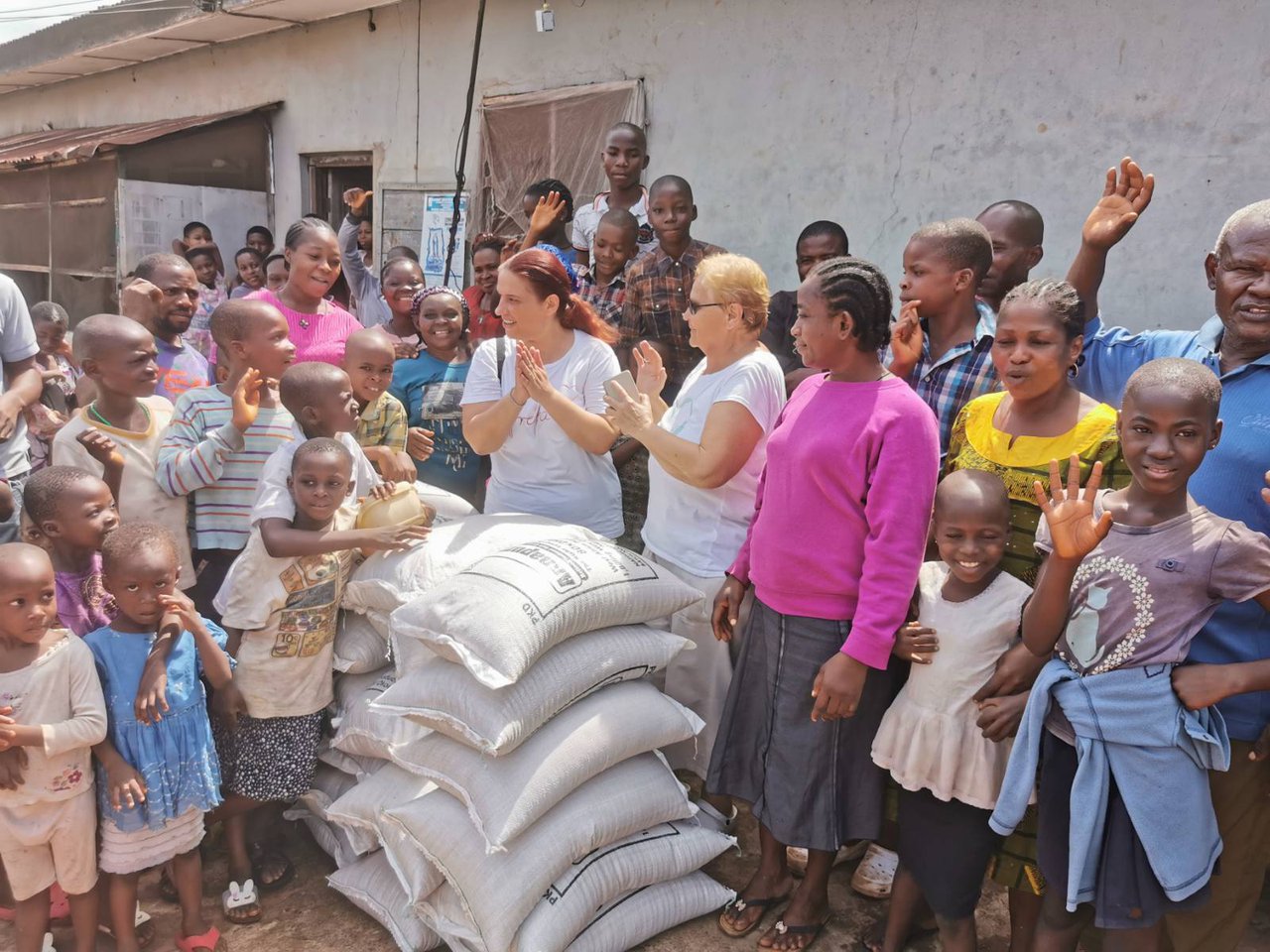
‘It was after this day that I asked Dr. Szeifert how the Sukoró congregation could contribute to the activities of the medical mission. He answered that every little help is appreciated, whether it is a box of bandages, some gauze or masks. I suggested announcing an opportunity to donate specifically for this cause, and using the funds raised to buy medical supplies, which the medical team could take with them on their next mission to Nigeria,’ Rev. Kardos recalls. The elders of the congregation discussed launching the fundraising in January, but the pandemic has meant a change of plan.
Ongoing fundraising
Ábel Kardos and his congregation would like to support the hospital in Onitsha and the Hungarian medical mission on an ongoing basis, therefore the fundraising has not stopped, and anyone can donate to the congregation’s bank account if they wish to support the initiative. ‘The pandemic has created a lot of financial instability in Hungary as well, and we are aware that many people support those in need in a variety of ways,’ says the pastor, adding: they cannot expect Reformed believers from the other end of Hungary to send donations, but if this should be the case, they are happy to forward it to the recipients.
DONATIONS IN THE TIME OF PANDEMIC
Ábel Kardos was notified at the end of March by Dr. Réka Fodor, who has taken over the medical mission duties from András Csókay and György Szeifert in the Nigerian hospital, that the congregation should not by medical supplies, because it seems that food is much more needed in the present circumstances. ‘Not only is Nigeria about to run out of medicine, but a terrible famine is also to be expected. I believe that rather than medical equipment, it is basic food that will be lacking in the country,’ opines György Szeifert. He adds that the nurses working at the hospital only earn twenty to thirty dollars a month, which means that they literally live on a dollar a day.
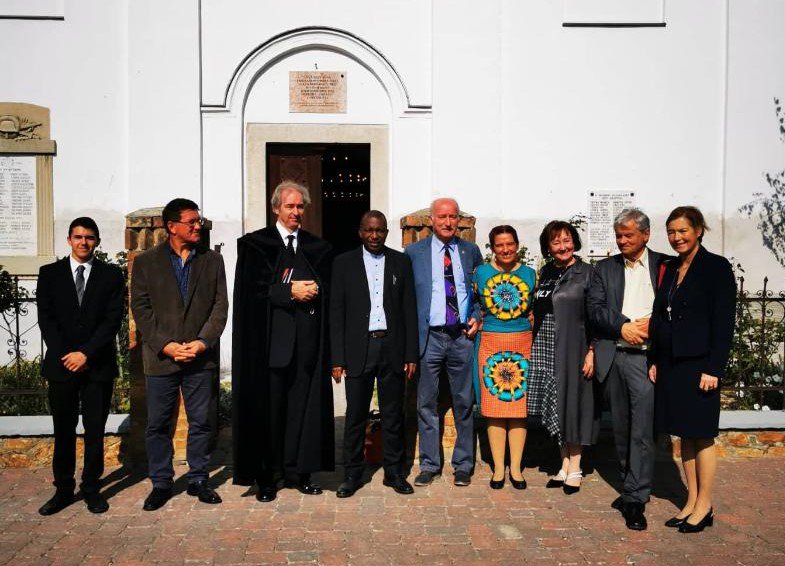
The pandemic measures introduced in Nigeria include a lockdown encompassing all thirty-six states, and markets have also been closed down, which is a problem because even if people had the financial means to create stockpiles for the time of home quarantine, they could not do so. ‘The closure of markets has resulted in higher prices for items such as rice, and the medical mission has now become a humanitarian one,’ says the pastor.
Ábel Kardos and his congregation ended up collecting two hundred and fifty thousand HUF (about $760), which has already been transferred to the account of Afréka Foundation. Under the current circumstances the pastor is glad they have been able to raise this sum in such a short period of time. In his experience even a fifth of this sum has been considered a success in previous fundraisers. The Reformed community of Sukoró has decided to continue supporting the hospital in Onitsha and the Hungarian medical mission working there with regular donations.
The article was originally published in the Reformed Weekly of RCH